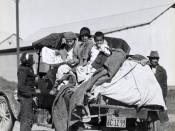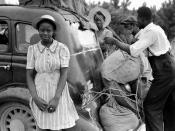Schwartz, Aaron
ENG 11 AP
10/4/04
The Bigger Tom
Nobody expected that they would be kicked off of their own land, but when so when it happened there were no manuals on what to do next. Everyone starts off on their own journey to start a new life. Not everyone is able to survive this great of a change. Steinbeck shows how the cooperative power of many is needed to succeed by developing the character of Tom Joad as a symbol for the majority of migrant workers.
When Tom Joad gets out of jail he returns straight home to family, whom he would do anything for if help was needed. At this point, like all the other farm workers, Tom considers his family to be anyone that is blood related, but still insists on helping people in need. When Casy follows him to his uncle's house and Tom invites him to dinner Casy says, "A fella shouldn' butt his head in where a fambly got fambly stuff"(108), to which Tom replies, "Come on in an eat"(108).
Since everyone was still doing well enough to survive comfortably, kindness was very common. Tom likes to help out his friends when he can. At the time all of the families gave food and shelter to those who needed them, but they do not consider them real family. He has not accepted Casy into the family, he is only showing an act of kindness. Tom never mentions him being a part of their family, instead he only tells him to "come on in", treating him like a stranger. Later when Casy asks if he can go along, Tom replies, "'Course I cant say right now... I guess maybe we better not say till all the men come"(127). All the migrant workers at this time...


